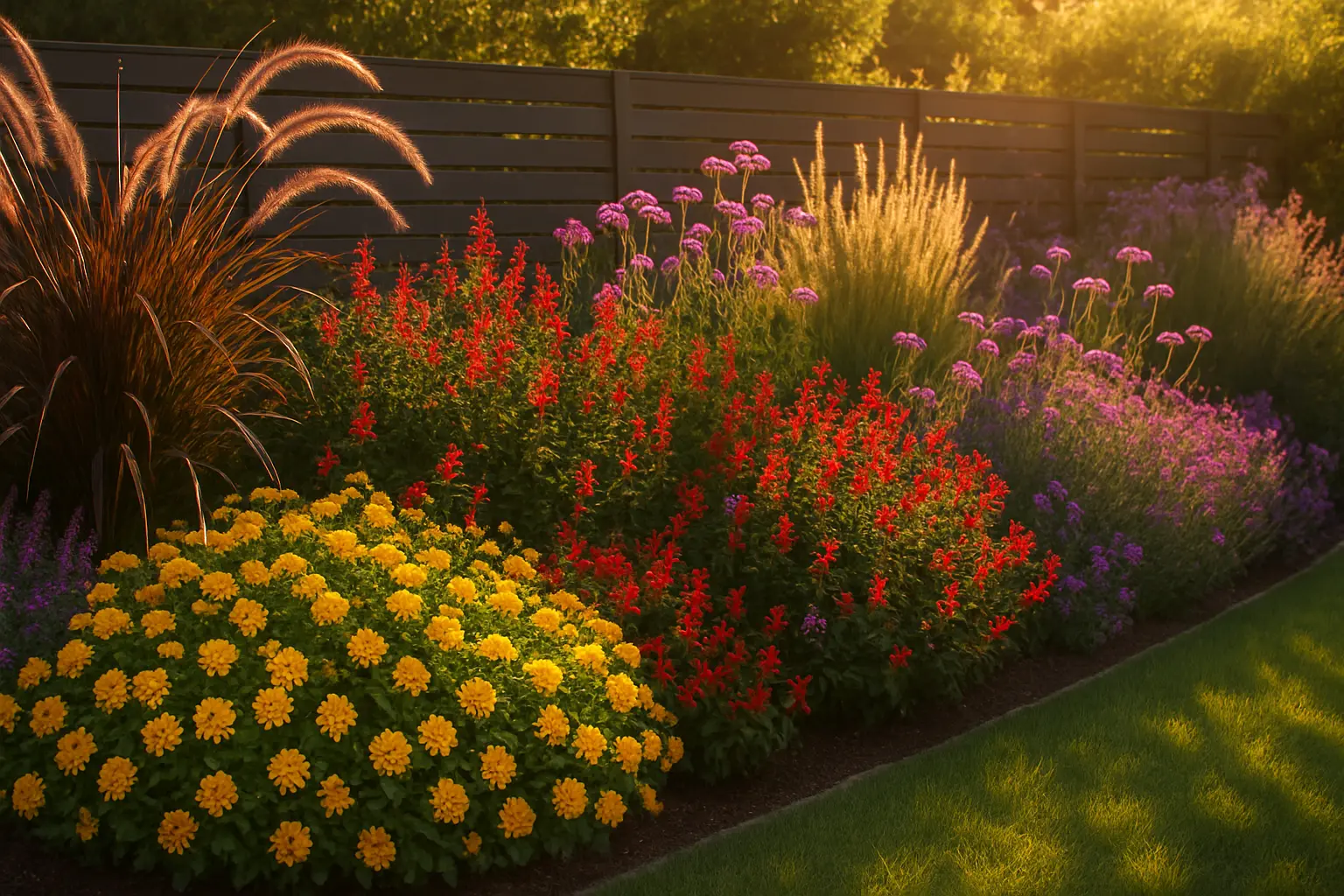Keep Color Alive: August‑Proof Plant Combos That Don’t Quit

If your borders fade in August, the fix is simpler than you think: repeat short lists of plants that love heat, add movement with grasses, and keep the palette clear. These four combos deliver color and texture straight through late summer with minimal water.
Combo 1: Sun‑drenched sunset
- Lantana ‘New Gold’ + Salvia greggii ‘Flame’ + Verbena bonariensis
- Accent with Pennisetum setaceum ‘Rubrum’ for motion
- Warm palette keeps energy high in full sun
Combo 2: Cool blue drift
- Russian sage (Perovskia) + Catmint (Nepeta ‘Walker’s Low’) + White gaura
- Add feather reed grass (Calamagrostis ‘Karl Foerster’) for structure
- Blue/silver foliage cools the scene visually in heat
Combo 3: Native pollinator lane
- Coneflower (Echinacea) + Black‑eyed Susan (Rudbeckia) + Little bluestem
- Seasonal seedheads feed birds; low water once established
Combo 4: Container glow‑up
- Thriller: Purple fountain grass
- Filler: Heuchera + dwarf lantana
- Spiller: Trailing bacopa or vinca
For more heat winners, see 10 Heat-Loving Plants That Thrive in Summer and structure tips from Water-Wise Garden Design.
Simple layout rule you’ll actually use
- Repeat plants in threes; stagger like brickwork for depth
- Keep palettes to 3–5 plants per bed for clarity
- Use one grass every 3–4 feet to carry movement and tie zones together
Water once, shine all week
- Deep soak weekly on new plantings; taper as roots run
- Mulch 1–2 inches over moist soil to lock in every drop
See it before you plant
Upload a photo to Gardenly and try these combos in your actual bed. Get Gardenly to generate instant before/after renders and a climate‑aware shopping list in minutes.
Reference for regional natives
- Explore native plant matches by region at the Lady Bird Johnson Wildflower Center
Pick a combo, repeat it confidently, and your August garden will carry rich color right into fall.
Why these combos work in heat
- Fine foliage + airy blooms keep airflow up and disease down
- Silver/blue foliage cools the scene visually and reflects light
- Grasses add motion and catch evening light for a glow effect
Spacing and staging cheat sheet
| Plant | Spacing | Notes |
|---|---|---|
| Lantana | 18–24” | Edge or mid; trims well |
| Salvia greggii | 18–24” | Shear lightly for repeat bloom |
| Verbena bonariensis | 18–24” | See‑through verticals |
| Perovskia | 24–30” | Cut back in late winter |
| Nepeta | 18–24” | Shear after first flush |
| Calamagrostis | 24–30” | Upright structure, low flop |
| Echinacea | 18–24” | Great seedheads for birds |
| Rudbeckia | 18–24” | Long bloom; loves heat |
| Little bluestem | 18–24” | Fall color and movement |
Color rules to keep beds coherent
- Choose one temperature: warm (gold/orange) or cool (blue/purple) per bed
- Repeat one anchor color at least three times
- Use foliage contrast (silver, chartreuse, burgundy) to frame blooms
Watering plan for low‑maintenance color
- New plantings: Deep soak 2× weekly for 2–3 weeks; then weekly
- Established: Every 7–10 days in heat; skip if rain >1 inch
- Mulch 1–2 inches; leave 2–3 inches clear around crowns
Small bed template (6×10 ft)
- Back: 3× Calamagrostis spaced 30”
- Mid: 5× Echinacea staggered; 5× Nepeta weaving
- Front: 7× Lantana as edge drift
- Accent: 3–5× Verbena bonariensis threaded through
Container trio recipes
- Tall pot: Purple fountain grass + trailing vinca
- Medium pot: Heuchera + dwarf lantana
- Low bowl: Nepeta dwarf + verbena
Regional swaps
- Arid West: Gaura, agastache, penstemon, blue fescue
- Humid South: Pentas, salvias, coreopsis ‘Moonbeam’, muhly grass
- Cool North: Echinacea, rudbeckia, nepeta, calamagrostis
Avoid these August pitfalls
- Overcrowding; airflow drops and mildew rises
- Heavy nitrogen now; it invites flop and pests
- Pale rock mulch that reflects heat into foliage
See it on your photo first
Upload your space to Gardenly . Try each combo, compare palettes, and export a climate‑aware shopping list. Get Gardenly to avoid guesswork and buy once.
FAQ
How many species is too many?
Keep to 3–5 per bed for clarity; add a grass to link zones.
Do I cut back perovskia now?
Light shear only; do the big cut in late winter.
Can I mix warm and cool palettes?
Yes, if you separate by space or anchor with a neutral (silver, white, deep green) and keep repeats strong.
Want instant, low‑water color through late summer? Test combos on your own photo with Gardenly and plant with confidence.
Budget snapshot
| Item | Qty | Est. cost | Notes |
|---|---|---|---|
| Perennials (1‑gal, 10–12 plants) | set | $120–$240 | Choose heat‑tolerant varieties |
| Ornamental grass (3–5) | set | $36–$100 | Carries the design |
| Compost/mulch | 3–5 bags | $15–$35 | Lock in moisture |
| Drip retrofit kit | 1 | $25–$50 | Consistent watering |
One‑day install plan
- Morning: Bed edge and clear, compost top‑dress, set plants by spacing map
- Midday: Plant and water‑in deeply; install drip
- Afternoon: Mulch lightly; stake where needed; photograph for reference
Maintenance calendar (late summer → fall)
- Week 1–2: Deep water every 3–4 days; light shear if transplant shock shows
- Week 3–4: Shift to weekly deep soak; deadhead to keep fresh
- September: Evaluate gaps; add a few repeats, not new species
Checklist
- Pick one color temperature per bed
- Limit species and repeat confidently
- Add a grass for structure and movement
- Deep water, then mulch on moist soil
- Use Gardenly to test combos before buying